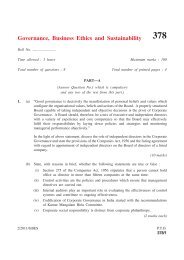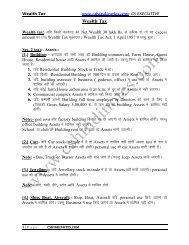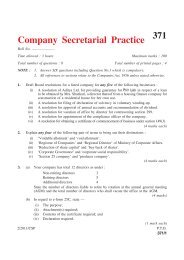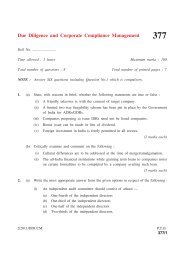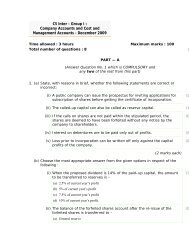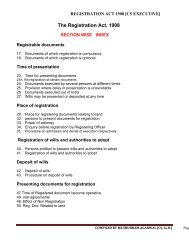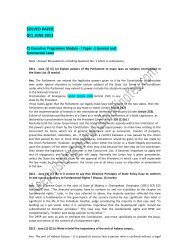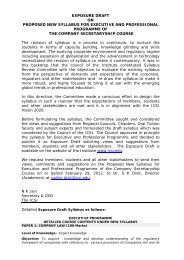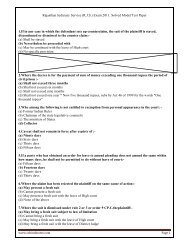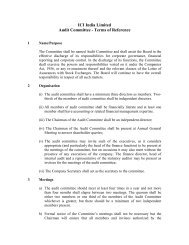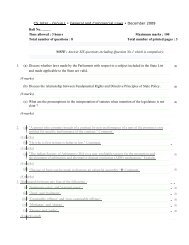CS EXECUTIVE SOLVED PAPER GCL GENERAL AND ... - cs notes
CS EXECUTIVE SOLVED PAPER GCL GENERAL AND ... - cs notes
CS EXECUTIVE SOLVED PAPER GCL GENERAL AND ... - cs notes
You also want an ePaper? Increase the reach of your titles
YUMPU automatically turns print PDFs into web optimized ePapers that Google loves.
<strong>CS</strong> <strong>EXECUTIVE</strong> <strong>SOLVED</strong> <strong>PAPER</strong><br />
<strong>GCL</strong><br />
Section 11 of the Act also embodies a rule which is based on the principle that restraint on the<br />
enjoyment of the property is invalid. The section lays down that where land is transferred by one to<br />
another, the transferor should not impose conditions as to how and in what manner the transferee<br />
should enjoy the property. As for instance, A sells his house to B and adds a condition that B only<br />
should reside in that house, the condition is invalid. This is subject to the exception that, if a person<br />
transfers a plot of land keeping another plot for himself, he can impose certain conditions which<br />
may interfere with the right of enjoyment of the transferee.<br />
(ii)Please Refer 2008 - Dec [4] (vi) on page no. 123<br />
Sale – As per Section 54 of the Transfer of Property Act, a sale is a transfer of property<br />
to another for consideration that is paid or promised, or partly paid and partly promised.<br />
The essentials of a sale are as under –<br />
(a) The seller must be a person competent to transfer. The buyer must be any person<br />
who is not disqualified to be the transferee under Section 6(h)(3).<br />
(b) The subject matter should be capable of being defined as transferable property.<br />
(c) There is a transfer of ownership.<br />
(d) It must be an exchange for a price paid or promised or part paid and part promised.<br />
(e) There must be present a money consideration. Any other valuable consideration but<br />
money makes it an exchange or barter but not a sale.<br />
Contract for sale<br />
A contract for the sale of immoveable property will be specifically enforced by a court<br />
unless special reasons to the contrary are shown. For example, if in a contract, A agreed<br />
to sell to B a plot X, this is a contract of sale, and specific performance of the contract<br />
can be ordered by the court.<br />
2010 - Dec [5] (c) Abhay’s agricultural land was purchased by the government for the purpose<br />
of construction of a factory but no duty was paid for this transfer by the government. Abhay<br />
wanted to take back his land on the ground that the government has not paid the duty and,<br />
therefore, no sale deed was executed. Will Abhay succeed Give reasons.(4 marks)<br />
Answer :Section 3 of the Indian Stamp Act, 1899 dealing with instruments chargeable with duty<br />
provides<br />
certain exceptions stating that no duty shall be chargeable in respect of any instrument executed<br />
by or on behalf of or in favour of the Government, in cases where, but for this the Government<br />
would be liable to pay the duty chargeable in respect of such instrument.<br />
In this case, Abhay's agricultural land was purchased by the government for the purpose of<br />
construction of a factory but no duty was paid for this transfer by the government. Abhay wanted<br />
to take back his land on the ground that the government has not paid the duty and, therefore, no<br />
sale deed was executed. As per the provisions of the section it appears that the government is not<br />
liable to pay duty. Therefore the instrument falls under the exception and it is not void. Abhay<br />
cannot take back his land on this ground.<br />
2010 - Dec [8] (a) Ajoy voluntarily makes a gift of his immovable property to Bijoy. Bijoy<br />
Keep visiting www.<strong>cs</strong>hindi<strong>notes</strong>.com Page 8


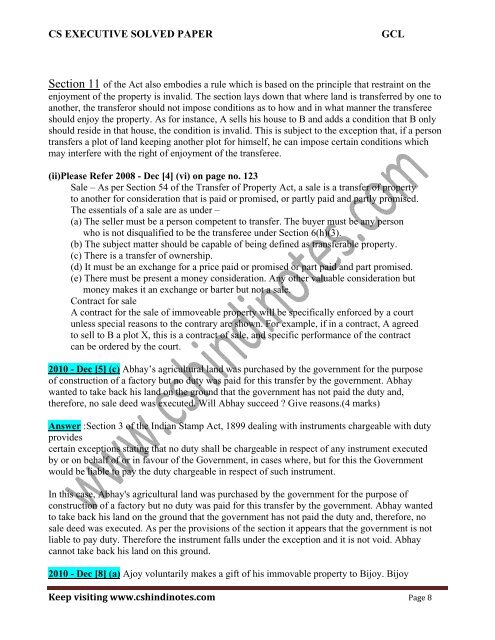
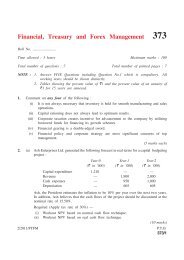

![vf/kfu;e dk vFkZ 'fu.kZ;' [ Interpretation of Statues ] Statue ... - cs notes](https://img.yumpu.com/38855798/1/190x245/vf-kfue-dk-vfkz-fukz-interpretation-of-statues-statue-cs-notes.jpg?quality=85)
